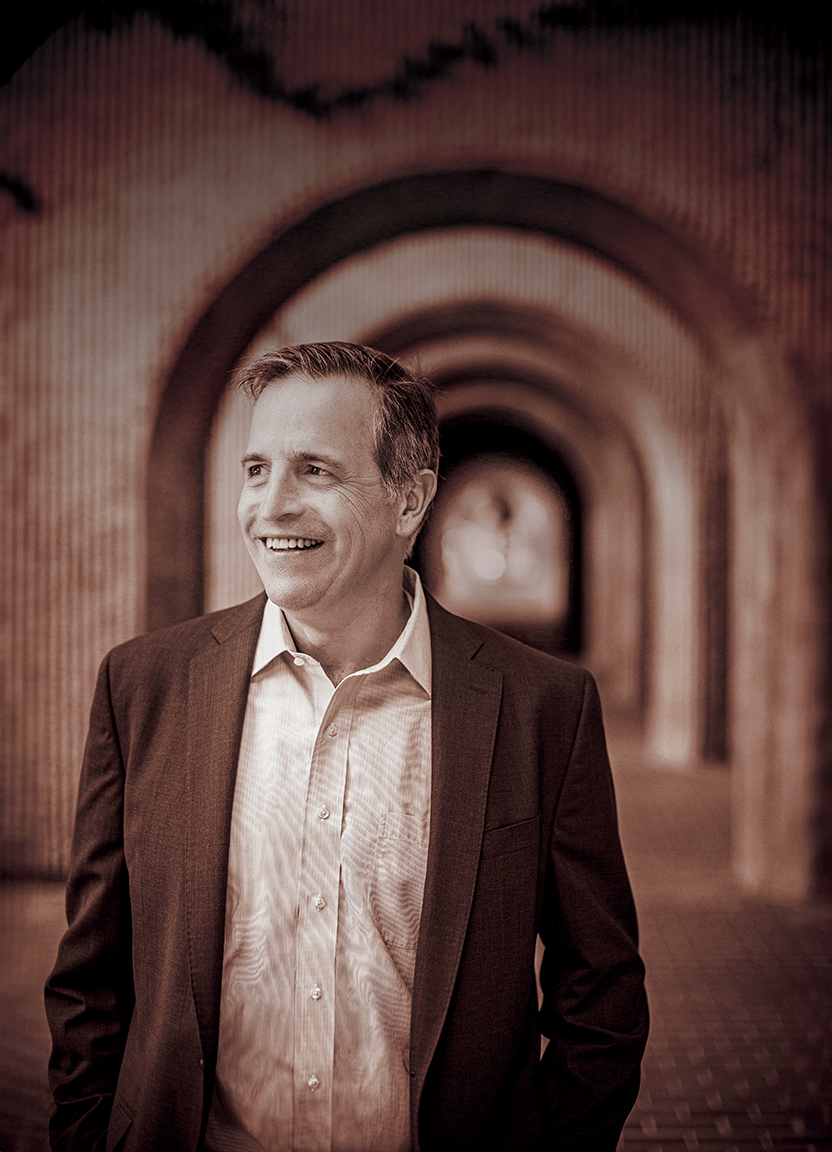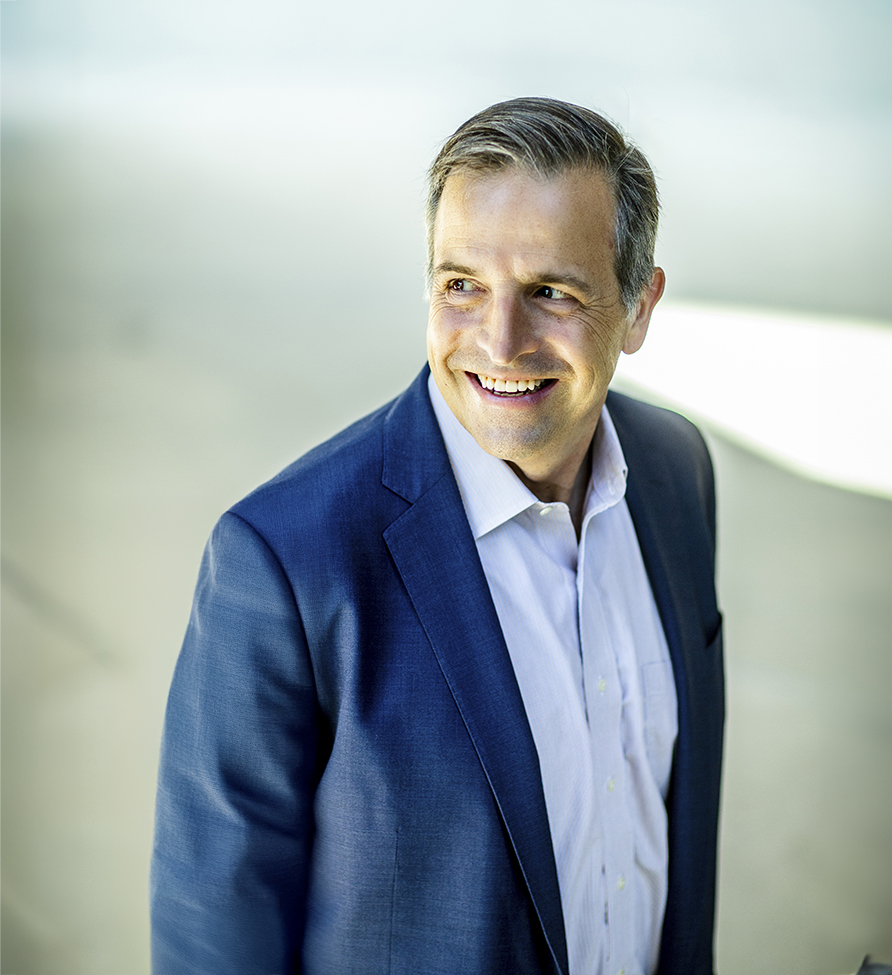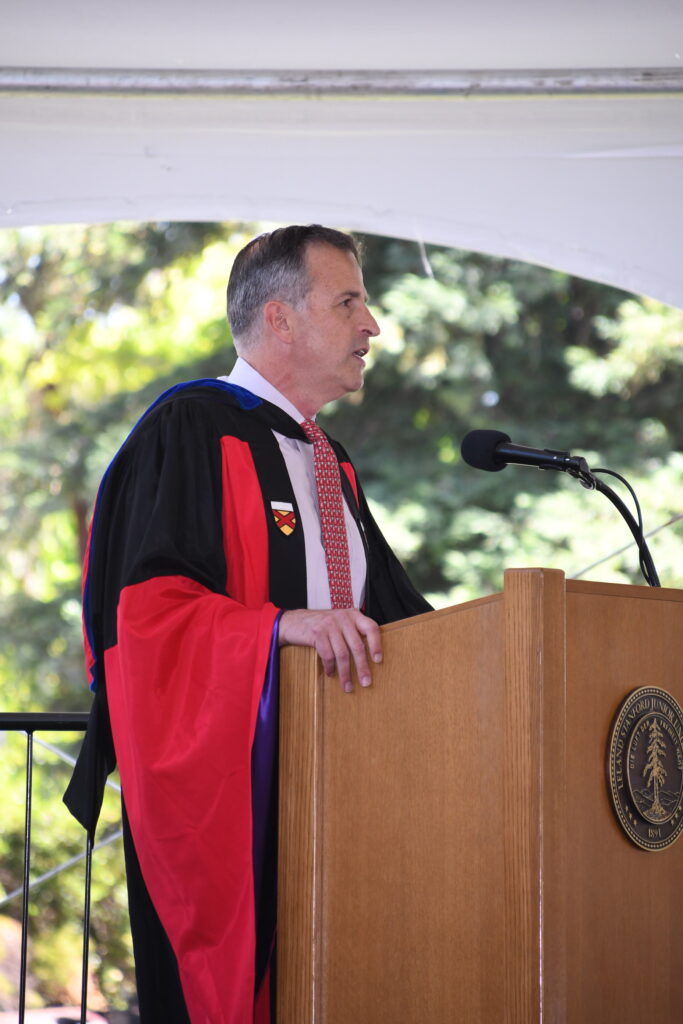Dean George Triantis
Pioneering Law and Business Scholar Takes the Helm at Stanford Law School

When George Triantis started his deanship, he became the first business law scholar in that role in more than four decades.
“I think that may have been just a coincidence,” Triantis says, smiling. “Constitutional law is the foundation of our nation’s democracy, and public law litigation is often viewed as core by our students who are driven to promote social good. But I have tried in my courses to highlight ways in which negotiation and agreement form the fabric of the legal system and will be an important part of their toolkit,” says Triantis, JSD ’89, who became the Richard E. Lang Professor of Law and Dean in June.
As Triantis settled into the role over the summer, he launched a few seemingly subtle changes at the law school to promote community and collaboration. A new gathering spot, Café Rouge, opened its doors to Crocker Garden, at the center of the law school campus, with ambient music. “I’d like it to be a hub where faculty, staff, students, and alumni can chat over coffee or lunch, or as they cross paths on their ways to class,” he says.
And the Levin Center for Public Service and Public Interest Law moved to a shared workspace with the Office of Career Services. “There was a physical separation between our two groups that provide career advising that sometimes gave students the impression of an either-or choice. In fact, most graduates will blend work in the private and public sectors, sometimes moving between the two over their careers,” he says. Subtle, yes, but impactful. The changes highlight Triantis’ priorities and background.
Triantis is a leading transactional scholar whose pathbreaking work in developing innovative principles of contract design is credited with bringing this important area of the law into the 21st century. This is his bailiwick, and his enthusiasm is contagious.
“I decided to engage in this area of law fundamentally because of my interest in productive relationships, how they are built and how they develop as the surrounding world changes over time,” he says.
It is this knack for bringing this area of law to life for students that has been the joy of Triantis’ teaching career. As the 15th dean of Stanford Law School, Triantis brings an array of talents—in the classroom and as a preeminent business law scholar—that will be needed to lead one of the top law schools in the country.
While Triantis begins his deanship—meeting with faculty, staff, and students and clocking thousands of miles traveling the country to meet alumni—a list of institutional priorities is taking shape. How can he bolster the post-COVID law school campus community, as students and faculty engage with the opportunities of and challenges to legal education, the legal profession, and society at large?
Martha Minow, former dean of Harvard Law School, got to know Triantis when he was on the faculty before he left for Stanford in 2011. “Academic leadership jobs are never easy, but this is an extreme period of jeopardy for academic institutions,” Minow says. “Having someone like George in a leadership role is so heartening and encouraging. He has integrity, he’s courageous, he’s calm. He can see the big picture.”
Robert Weisberg, JD ’79, Edwin E. Huddleson, Jr. Professor of Law, met Triantis almost 40 years ago when he was supervising Triantis’ JSD research at Stanford. He thinks Triantis will bring a fresh perspective. “George comes with an open mind. And he’s honest—disarmingly so. He’s not afraid to say, ‘I don’t know much about that. Tell me more.’ I think students will understand that he’s someone who will listen without preconceptions.”
Robert Scott, Columbia Law professor and former dean of the University of Virginia School of Law when Triantis taught there in the 1990s, has known Triantis as a colleague, co-teacher, and co-author.

“Great American law schools are all about the production of ideas about law. You need a scholar as dean, someone with credibility, to encourage others to continue to produce to the best of their abilities. George has that—a deep commitment to the scholarly mission and a proven track record of excellence. My view is that Stanford Law School lucked out,” Scott says. “George is certainly one of the great commercial law, law and economics, contracts, and bankruptcy scholars of his generation. He’s among a small handful of leading scholars in his field.”
As he nears the end of his first quarter as dean, Triantis is bringing the same methodology that has defined his scholarship to his new role: combining innovative, out-of-the-box thinking with careful consideration, collaboration, and a drive to get things done.
It may not be surprising to hear Triantis described by other leading academics as a “preeminent scholar of his generation,” “one of the brightest academic stars in business law,” and “a leading figure in the world of private law.” More surprising, however, is to learn that his career path was somewhat accidental.
“I didn’t have a grand plan for my career. Instead, it was a series of extremely lucky one-off choices,” says Triantis. He attended high school in Toronto, graduated early, and matriculated at the University of Toronto when he was just 15. Perhaps because he was young, he veered toward mathematics.
“I lacked the maturity for the humanities, and math seemed much more accessible,” he says. “Law, economics, and academia were the furthest things from my mind, so I surprised myself by majoring in economics and deciding to enroll in law school right after graduating.”
After several years of transactional practice at a corporate law firm, Triantis decided to take a break to delve more deeply into the questions that had come across his desk. He was admitted to Stanford Law School’s graduate program to study debt contracts, and he also served as a teaching fellow. Weisberg was his supervisor and trusted advisor.
“Bob was a tremendous resource for me during those years,” says Triantis. “He kept me focused and gave me invaluable counsel in my dissertation, even though my research wasn’t in his principal area. I can honestly say that I wouldn’t have been able to launch my academic career but for Bob … another lucky break for me.”
Triantis began his academic career in 1989 as an assistant professor, jointly appointed in the schools of law and of management at the University of Toronto, where he found a mentor in Michael Trebilcock, a legendary figure in the Canadian legal academy. In the early 1990s, Triantis’ publications included economic analyses of the contractual tools for allocating business risk and a seminal article on debtor-in-possession financing, a practice that was just starting to gain traction in bankruptcy at the time.
“What drew me to this area [of contract design] is a curiosity about how successful, productive collaborations are formed,” he says. “Contracts play a role in these relationships, but I was curious as to how significant a role legal enforcement of promises plays in a variety of contexts. What elements of productive ventures are included in legal documents, and how and which ones are left to the nonlegal ‘relational’ forces? This led me to an interest in the interplay between negotiations over collaborative efforts and the legal agreements that they produce.”
Triantis has held endowed faculty positions at the law schools of the University of Toronto, University of Virginia, University of Chicago, Harvard University, and Stanford University. He has also held positions in university leadership, working recently in Stanford’s Office of the Vice Provost and Dean of Research on various issues concerning research integrity and policy. Along the way, he has collected an impressive cohort of collaborators and friends across the continent.
Ronald Daniels met Triantis in 1989 when both were starting their academic careers at the University of Toronto School of Law, where they shared an expertise in law and economics and commercial law, and had offices on the same hallway.
“George’s brilliant academic career has been marked by his capacity to link sophisticated economic and finance theory with real-world organizations and contractual structures,” says Daniels, president of Johns Hopkins University. “He is a meticulous scholar who systematically interrogates the decisions that humans make to support joint economic activity and then explains those decisions in accessible but principled terms.”
Daniels recalls that Triantis’ interest in real-world context once led him to teach a class at UVA about the commercial contracts of wineries. Knowing little about wines themselves, Triantis was drawn to the organizational issues. “True to form, George threw himself into meeting a host of different businesses—from the owners of wineries to the vintners who made the wines to the distributors and beyond. Then he persuaded many of these companies to share with him the contracts that governed their relationships. Over the years, he has devoted the same care and thought to understanding the workings of the university. How it makes and implements critical strategic decisions in a changing landscape.”
In the mid-1990s, the two co-authored a widely cited article on the role of debt in corporate governance and they collaborated on several other ventures. They have stayed in close touch through the years that would take them from their native Canada to the United States. Daniels thinks Triantis is uniquely qualified for the deanship.
“George has a commanding intellect, but an even bigger heart. I can’t imagine a better leader for the law school at this point in time,” says Daniels.
“Having someone like George in a leadership role is so heartening and encouraging. He has integrity, he’s courageous, he’s calm. He can see the big picture.”
Martha Minow, Harvard Law School professor and former dean
Some people like to jog or hike, while others watch football. For Triantis, it is time spent on frozen water, enjoying skiing or ice hockey—or kicking back and examining an issue from all sides with friends and colleagues. There are several repeat players in this endeavor. One is Robert Scott, his colleague at UVA. Their collaboration clicked from the start, and they have spent countless hours in shared discussion, which led to several important papers on contract theory. Their work focused on options that are embedded in commercial contracts and the important links between the design of contract provisions and the litigation that enforces them.
“George was the intellectual inspiration behind those projects,” says Scott. “I would certainly credit him with being the intellectual archetype of both of our early papers. I can’t overestimate his contribution.”
Julian Nyarko, professor of law at Stanford, recalls coming to campus when he was on the teaching market, fresh from a fellowship at Columbia Law.
“My job talk paper was on contracts and how contracts are drafted. I cited George’s work several times in my paper,” says Nyarko, who joined the SLS faculty in 2019.
He appreciates Triantis’ contributions to the field, but also his methods.

“He thinks carefully and deeply about very fundamental problems in contract law. He’s a contract theorist. Many scholars employ math to explain their work or focus on problems that are not really relevant to most people. What is fascinating about George is that he is a very deep thinker and a careful scholar but also has a real knack for picking fundamental, practically relevant problems,” says Nyarko.
What stands out to many junior faculty is the effort Triantis made in welcoming them to campus.
“George made an effort to connect with the junior faculty. And he really took it upon himself to help me settle in as a new professor—checking to see how my teaching was going, reading my work, and offering feedback,” says Colleen Honigsberg, who joined the faculty in 2016 and is now a professor of law, dean for curriculum, and faculty co-director of the Arthur and Toni Rembe Rock Center for Corporate Governance.
Honigsberg particularly enjoyed co-teaching with Triantis during her first year on the faculty.
“I wasn’t much older than some of the students, and he co-taught Current Issues in Business Law with me, each of us taking turns picking topics and alternating teaching. He would offer valuable feedback on my teaching,” she says.
Nyarko also considers Triantis a mentor and someone he can turn to for honest, scholarly input.
“You have a theory in your mind, and you want to push ahead. But George breaks the claims down to the basics, as he tries to understand and analyze every step of your argument. Slowly, the conversation surfaces new questions and assumptions, ones I wasn’t even aware of,” Nyarko says.
Alexis Abboud, JD ’21, recalls taking 1L Contracts with Triantis. Now a litigation associate at Wachtell, Lipton, Rosen & Katz, she had no lawyer role models in her family so was grateful to have Triantis for that early introduction and for his career guidance.
“He emphasized that contract law is an important piece in the law because it gives people the autonomy and power to structure their interactions in the way that makes most sense to them,” says Abboud.
Triantis’ lessons helped her place legal studies into a larger framework.
For Triantis, sharing his passion about transactional law is an essential way to equip students with the tools for a career in law. He recalls a case study written with the general counsel at the International Federation of the Red Cross for students in Stanford Law’s W. A. Franke Global Law Program. The students were asked to draft—and anticipate regulatory obstacles in drafting—significant portions of contracts for the procurement of relief supplies for victims of the Syrian earthquake in 2023.
“It was an important lesson in how transactional skills are important in the philanthropic—or more broadly public—sector, as well as in private practice,” notes Triantis.
In fact, when they presented their work in Geneva, the Franke Fellows discovered that the eight attorneys from the IFRC whom they met had spent years in corporate law firms around the world, honing their transactional skills prior to joining the Red Cross. “They brought these tools with them to a philanthropic organization. It turned out to be one of those fortuitous teaching moments,” Triantis says.
“He struck me, even then, as someone who had the right kind of personality, judgment, and academic quality and integrity to be dean.”
Former SLS Dean Larry Kramer, now president of the London School of Economics
One of Triantis’ first actions as dean was to establish a faculty committee on artificial intelligence to look at how its tools can be deployed in the teaching, research, and operations of the law school. Stanford Law is a hub for deep analysis about the impact of AI on all aspects of law—including the practice of law itself—as well as the various calls to regulate the technologies. And a growing number of faculty are incorporating its implications into their research.

This is not a new area for Triantis, who has been thinking about the implications of AI on legal institutions for a while. Early in 2008, when he was appointed to the Eli Goldston Professorship at Harvard Law School, he delivered a public lecture titled “The Future of Transactional Legal Practice.” He predicted then that advances in technology would gradually lead transactional lawyers to refocus their services on providing advice and good judgment more than document production. They would also need to think more about innovation in contract design and that technology itself would provide valuable tools in this respect.
“When I was dean, I drew on George’s wisdom often,” recalls Harvard’s Minow. “We shared many intellectual interests, including AI and innovation. There are not that many people in law schools who’ve been interested in technological developments for as long as he has. He was early to it.”
Triantis sees the acceleration of change underway in both the legal profession and legal education—and the leadership role for Stanford Law in harnessing the transformative power of the new technologies in those sectors.
“Adaptation requires exploiting the benefits of new technologies while being aware of and preparing for the hazards they may present, not only to legal institutions but to society as a whole. The rise of large language models and other tools of artificial intelligence are inflections that dramatically increase the pace with which Stanford Law needs to adapt, anticipate, and lead. Stanford Law is uniquely poised to meet that challenge,” says Triantis.
“George has this idea that Stanford Law should have a leadership role in this space, which I think is right—we are in Silicon Valley,” says Nyarko, a big-data researcher who also serves as associate director and senior fellow at the Stanford Institute for Human-Centered Artificial Intelligence and who chairs the school’s faculty committee on AI.
Weisberg thinks that Triantis’ distinct scholarly temperament will serve him well as dean—no matter the challenges.
“Law professors are notorious for being verbally aggressive. Notwithstanding the fact that he taught at the University of Chicago, which has a reputation for robust and adversarial argument, George has always been viewed as a model of the temperament that we need in civil discourse,” says Weisberg.
Larry Kramer, former SLS dean, now president of the London School of Economics, recruited Triantis to Stanford in 2011 and echoes Weisberg’s assessment.
“He struck me, even then, as someone who had the right kind of personality, judgment, and academic quality and integrity to be dean,” says Kramer, who first met Triantis when he was visiting at NYU Law in the mid-1990s.
In everything Triantis hopes to achieve, a strong community and teamwork are essential.
“In academia, the assumption of egalitarianism and cooperation can take navigational skills, too. I endorse these things, but it means that everything has to be negotiated, and everything is collaborative,” Minow says. “Well, collaboration is George’s middle name.” SL
